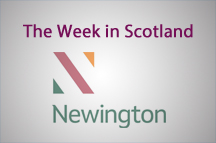 It certainly would have been hard to miss the biggest news story of Scottish politics this week. Kicking off the week, the First Minister announced, on Monday, her intention to ask the Scottish Parliament to start the process of holding a second independence referendum.
It certainly would have been hard to miss the biggest news story of Scottish politics this week. Kicking off the week, the First Minister announced, on Monday, her intention to ask the Scottish Parliament to start the process of holding a second independence referendum.
From here, the process is both fairly straightforward and fraught with complexity. Next week, the Scottish Parliament will debate the issue and it is more or less inconceivable that the parliament won’t agree. This is due to the ruling Nationalists and secessionist Greens together having a majority in Parliament. At the time of writing we don’t know the wording of the debate yet, but we do know it’s going to be a big parliamentary occasion. Scottish Government Business for Tuesday and Wednesday has already been given over to a debate entitled “Scotland’s Choice”.
Whatever the actual words of the debate next week, it will seek consent for a Section 30 Order as laid out in the Scotland Act 1988, which created the Scottish Parliament. The Section 30 Order has to be issued by the Privy Council and signed by the Monarch after approval from the UK and Scottish Parliaments. Sounds complicated, however this is the same process that led to the Edinburgh Agreement in 2012 which set out the agreed terms under which a legal referendum on Scottish Independence could be held in 2014.
In case you are struggling to remember that far back - it was, after all, a generation ago - the Edinburgh Agreement was signed between the UK and Scottish Governments stating:
The governments are agreed that the referendum should:
- have a clear legal base;
- be legislated for by the Scottish Parliament;
- be conducted so as to command the confidence of parliaments, governments and people; and
- deliver a fair test and a decisive expression of the views of people in Scotland and a result that everyone will respect.
Despite opportunities for political shenanigans by both governments, the process is likely to remain the same, resulting in a binding agreement between both governments over the conduct of the next referendum.
 There are, of course, some voices in the UK Government and elsewhere suggesting that legislative consent should be withheld but that seems unlikely. There will be arguments about timing. Theresa May’s “now is not the time” language feels like an opening salvo in negotiations rather than, as some commentators are suggesting, a definitive rejection of the proposition. Expect further debate on detail of the wording of the referendum question in the coming weeks but ultimately an agreement will be found and the referendum held in the next few years.
There are, of course, some voices in the UK Government and elsewhere suggesting that legislative consent should be withheld but that seems unlikely. There will be arguments about timing. Theresa May’s “now is not the time” language feels like an opening salvo in negotiations rather than, as some commentators are suggesting, a definitive rejection of the proposition. Expect further debate on detail of the wording of the referendum question in the coming weeks but ultimately an agreement will be found and the referendum held in the next few years.
Whatever side of the debate you find yourself on, we are in for a few years of lively debate. The public affairs industry will no doubt find itself with plenty of work doing, what it does best: keeping clients informed of the process, the debates, the implications of the referendum and the consequences thereafter. Whether or not you want to take an active role in process, if the previous referendum is anything to go by, this is going to be the hot topic of conversation for the next few years. We truly do live in interesting times.












